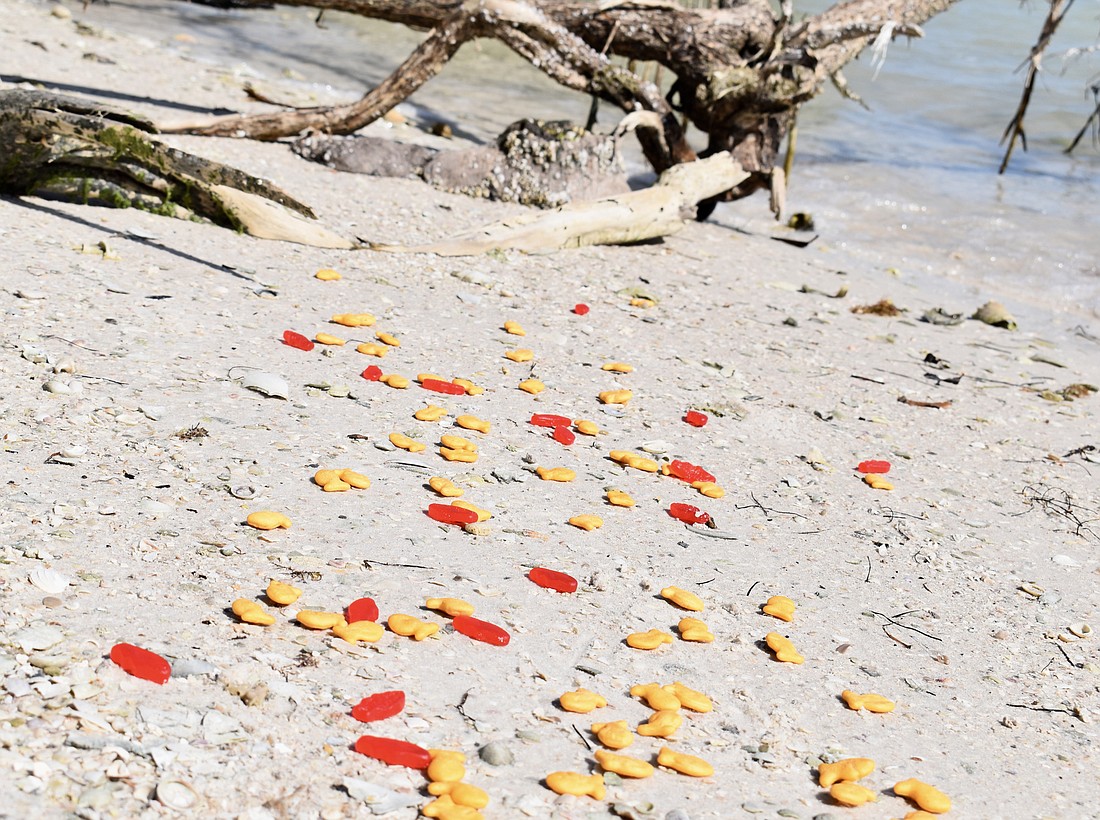- November 17, 2024
-
-
Loading

Loading

APRIL FOOLS -- A fish-kill scare last weekend that initially worried tourism officials and shocked city leaders and wildlife experts was traced to a sloppy family from Waukegan, Illinois and not a red-tide event in the Gulf of Mexico, officials said.
State and local red tide hotlines began receiving calls from Longboat Key on Saturday, March 26 through that weekend with frequent and consistent reports from residents who were concerned about a “massive die-off of sea life.’’
More than 110 calls were received on town emergency-services phone lines, and dozens more were fielded by the state Department of Environmental Protection and Mote Marine Laboratory and Aquarium.
One caller reported seeing tiny, perfectly shaped orange fish in a trail along the surfline in front of the Diplomat Resort. Others reported slightly larger, translucent fish in red as far south as the Quick Point Park, as far east as the canals of Country Club Shores and as far north as Ohana (but not a step farther).
“A variety of small fish in a wide array of colors on the beach, floating in the bay, gulf and canal waters. It seemed like they were everywhere. It was really scary,’’ said a town spokeswoman on the condition of anonymity because she was not authorized to speak publicly.
Adding to the confusion was a story under the headline CARCASSES ON OUR SHORES written by a former New York Times scribe in a local weekly newspaper claiming the town knew about the situation for days but refused to act to avoid upsetting visitors during the height of tourist season.
On Monday, as experts began trying to piece together what had happened, the town responded to a stack of media inquiries with a measured and well-reasoned statement: “We monitor the situation each day and have determined the concentration to be minor to moderate. We believe our beaches are safe. There is no cause for alarm.”
The first break in the investigation came Tuesday, March 29 when Matt Hooper, an oceanographer with Mote, noticed there was no horrible odor normally associated with tons of decaying sea life.
“I held one up, noted its shape, size, weight and coloring as a scientist should,’’ he said. “On a whim, I popped it in my mouth. Sharp cheddar. Delightfully crunchy. It was then I knew this was no fish kill, it’s was a snack spill.’’
Calls for help spread quickly, though, reaching the highest level of state government. In a news conference Monday morning, Gov. Ron DeSantis blamed the “unprecedented damage to our beaches on the Biden Administration’s disregard for the fine people of the Free State of Florida. I call on the federal government to deliver the millions of dollars in resources, relief funds, compensatory damages, free dinners, gasoline cards, and expanded federal unemployment compensation we need to restore our beaches to the pristine state they were before this catastrophic natural disaster took place.’’
Hooper’s forensic follow up examined hours of security footage from all over the island, and everywhere a patch of Goldfish, Swedish Fish or imported-from-Japan Meito Puku Puku Tai fish-shaped wafers were spotted, so was an unkempt vacationing family.
The two parents and four children, initially unidentified, on the videos wore mismatched clothing, pulled wagons filled to the brim with beach supplies, snacks and soft drinks and each wore a novelty hat of some sort.
With the help of the town’s license plate recognition system, Hooper and town detectives connected a wood-paneled Chrysler minivan with the Wurff family of the Chicago suburb of Waukegan.
Police found the family staying in two rooms at a vacation resort.
“Well, you got us,’’ patriarch Howard Wurff said, adding his 9-year old son Nelson (“we call him Booger”) insisted on bringing sweet and savory snacks with him where ever the family went. “He probably spilled more than he ate. You should see the backseat of the van.’’